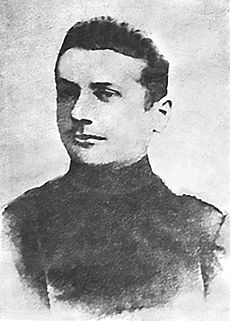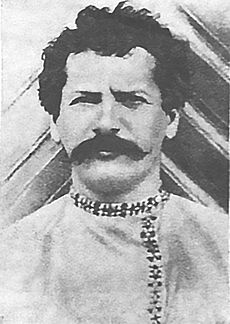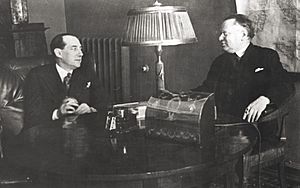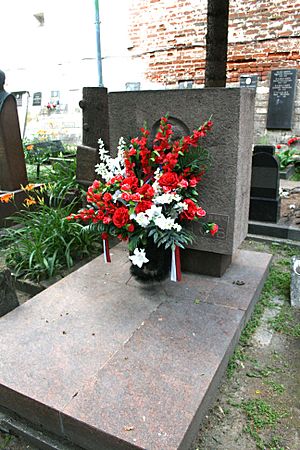Maxim Litvinov facts for kids
Quick facts for kids
Maxim Litvinov
|
|
|---|---|
| Макси́м Литви́нов | |
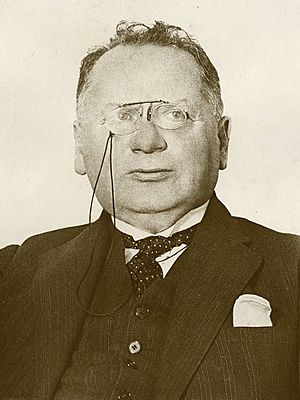
Litvinov in 1932
|
|
| Russian Ambassador to the United States | |
| In office 10 November 1941 – 22 August 1943 |
|
| Premier | Joseph Stalin |
| Preceded by | Konstantin Umansky |
| Succeeded by | Andrei Gromyko |
| In office 1918–1919 |
|
| Premier | Vladimir Lenin |
| Preceded by | Boris Bakhmeteff |
| Succeeded by | Ludwig Martens |
| People's Commissar for Foreign Affairs of the Soviet Union | |
| In office 21 July 1930 – 3 May 1939 |
|
| Premier | Alexei Rykov Vyacheslav Molotov |
| Preceded by | Georgy Chicherin |
| Succeeded by | Vyacheslav Molotov |
| Personal details | |
| Born |
Meir Henoch Mojszewicz Wallach-Finkelstein
17 July 1876 Białystok, Russian Empire |
| Died | 31 December 1951 (aged 75) Moscow, Russian SFSR, Soviet Union |
| Nationality | Russian, Soviet |
| Political party | RSDLP (1898–1903) RSDLP (Bolsheviks) (1903–1918) Russian Communist Party (1918–1951) |
| Spouse | Ivy Litvinov |
| Profession | Diplomat, civil servant |
Maxim Maximovich Litvinov (born Meir Henoch Wallach; 17 July 1876 – 31 December 1951) was an important Soviet leader and diplomat. He served as the People's Commissar for Foreign Affairs, which is like a foreign minister, from 1930 to 1939.
Litvinov believed in solving problems through talking and agreements. He worked for disarmament, which means reducing weapons. He helped the Soviet Union join the 1928 Kellogg–Briand Pact. This pact was an agreement to avoid using war to solve problems between countries.
He also created the 1929 Litvinov Protocol. This was an agreement between the Soviet Union and its neighbors. It aimed to make the Kellogg-Briand Pact work better.
In the 1930s, Litvinov pushed for a policy called collective security. This meant working with Western countries to stand against Nazi Germany.
Contents
Early Life and First Exile
Meir Henoch Wallach was born in Białystok, Russian Empire. His family was wealthy and Jewish. In 1893, he joined the army. He was discharged in 1898. This happened after he reportedly refused an order to shoot at striking workers.
In 1898, Wallach joined the Russian Social Democratic Labour Party (RSDLP) in Kiev. This group was against the government and was illegal. Members often used fake names. Meir changed his name to Maxim Litvinov. He also used other names like "Papasha" and "Maximovich."
Litvinov's early jobs included spreading the party's ideas. In 1900, he joined the Kiev party committee. He and the other members were arrested in 1901. After 18 months in jail, Litvinov and Nikolay Bauman planned a big escape. They helped 11 prisoners get out of Lukyanivska Prison.
Litvinov then moved to Geneva. There, he worked for the revolutionary newspaper Iskra. He set up a way to sneak the newspaper from Germany into Russia.
In July 1903, Litvinov was in London for a party meeting. The RSDLP split into two groups. He became a founding member of the Bolshevik group. This group was led by Vladimir Lenin. Litvinov first met Lenin at the British Museum Reading Room. They stayed in touch during this time. Litvinov went back to Russia during the 1905 Revolution. He became the editor of the RSDLP's first legal newspaper, Novaya Zhizn.
Second Emigration
In 1906, the Russian government started arresting Bolsheviks. Maxim Litvinov left Russia again. He spent the next ten years living abroad. He also bought weapons for the party. He lived in Paris and traveled across Europe.
He pretended to be an officer from Ecuador. He bought machine guns in Denmark. He also pretended to be a Belgian businessman. He bought more weapons from Germany. He sent these weapons to Bulgaria. He told officials they were for rebels fighting in the Ottoman Empire.
Litvinov then bought a yacht. He gave it and the weapons to Kamo. Kamo was a revolutionary who was supposed to smuggle them across the Black Sea. But the yacht got stuck, and the weapons were stolen. Despite this, Litvinov successfully smuggled weapons into Russia. He did this through Finland and the Black Sea.
In 1907, Litvinov went to another party meeting in London. He shared a rented house with Joseph Stalin. In January 1908, French police arrested Litvinov. He was carrying money that had been stolen in a bank robbery. The Russian government wanted him sent back. But a French minister said his crime was political. Litvinov was deported instead.
He went to Belfast, Ireland. He taught foreign languages there until 1910. Litvinov moved to England in 1910 and stayed for eight years. In 1912, he took over from Lenin. He became the Bolshevik representative on the International Socialist Bureau.
When First World War started in 1914, Russia asked its citizens in England to return. They were needed for the army. Litvinov convinced an English officer that he would be put on trial if he went back. So, he was allowed to stay.
In February 1915, Litvinov went to a meeting of socialists. He spoke against the war. He believed that countries should stick to their agreements. This idea became very important to him later in his career. In 1916, Litvinov married Ivy Low in England.
Diplomatic Career
First Soviet Representative to Britain
On 8 November 1917, after the October Revolution, Litvinov got a new job. He was named the Soviet government's representative in the United Kingdom. His role was never officially recognized. But he acted as an unofficial contact.
In January 1918, Litvinov spoke at a Labour Party meeting. He praised the revolution. Later, in September 1918, the British government arrested Litvinov. This was because he had spoken at public meetings against Britain's involvement in the Russian Civil War. He was held until he was exchanged for a British agent.
After his release, Litvinov returned to Moscow in late 1918. He joined the People's Commissariat of Foreign Affairs. He was sent to Stockholm, Sweden, to present a Soviet peace message. He was later deported from Sweden. But he continued to work as a traveling diplomat. He helped arrange an agreement to exchange prisoners of war. This included prisoners from Russia, the UK, and France. This success showed how important Litvinov was in Soviet diplomacy. It also meant other countries unofficially recognized the new Russian government.
Litvinov also tried to get money for the Daily Herald newspaper. This paper supported the Labour Party. But the newspaper did not accept the money because it caused too much public attention.
Irish Contacts and the Anglo-Soviet Trade Agreement
In February 1921, the Soviet government was contacted by the Irish Republic. Ireland wanted a treaty of recognition and help. Litvinov told the Irish envoy that the Soviet Union's main goal was a trade agreement with the UK.
In March 1921, the Anglo-Soviet Trade Agreement was signed. This allowed trade between the two countries. But the British government and press complained about Soviet actions. In June, the British government published a proposed treaty between Ireland and the Soviets. This caused headlines about Communist involvement in the Irish War of Independence.
The British Foreign Secretary sent a protest note to the Soviet Government. He accused them of working against British interests. Litvinov replied strongly. He said the British had been tricked by "forgers and swindlers." He also said the Soviet government had told its representatives to stop any anti-British actions after the trade agreement.
Litvinov also pointed out that Britain had not been friendly to Russia. He mentioned the arrest of Russian trade agents and cooperation with France against Russia. He said these actions did not help build friendly relations.
First Deputy People's Commissar of Foreign Affairs
In 1921, Litvinov became the First Deputy People's Commissar of Foreign Affairs. He was second in command to Georgy Chicherin. They were very different people. Chicherin was refined but against Western ideas. He wanted Russia to stay separate from capitalist countries. Litvinov was more practical. He was willing to work with Western countries for peace. He wanted to give Russia time to develop internally.
In 1924, full diplomatic relations were restored with Britain. This happened under the Labour government. But the Conservative Party and businesses were still against the Soviet Union. They were worried about Soviet debts and the spread of Bolshevism. This got worse when the Soviet government supported the 1926 General Strike.
Litvinov wanted to stop relations from getting worse. He suggested talks with the UK's representative in Moscow. The representative agreed with some of Litvinov's points. He said Britain had already recognized the Soviet government. He also said that anti-Soviet campaigns hurt trade. He argued that Russia was an important market.
The Conservative government later cut ties with the Soviet Union. This was based on unproven claims that the Soviet Trade Mission had stolen a document. Litvinov said this decision was "no surprise." He called the claims baseless. He also said the police raid on the Soviet office was wrong.
When the Labour Party won the 1929 election, relations were restored. The new Prime Minister wanted the Soviet Union to stop propaganda in Britain. Litvinov wanted to be flexible. But Joseph Stalin overruled him. This led to Britain giving unconditional recognition to the Soviet Union.
Supporter of Disarmament
Litvinov strongly supported disarmament. He attended meetings from 1927 to 1932. He first suggested complete disarmament. A French politician criticized this idea. He said that without an international force, a powerful nation could still attack a smaller, disarmed one.
Litvinov replied that small nations would be safer if powerful neighbors disarmed. He said this would remove the advantage of bigger weapons. His ideas gained him support in Western countries. Many people wanted disarmament and were frustrated by slow progress.
Litvinov also supported the Kellogg-Briand Pact of 1928. This pact aimed to stop war as a tool of foreign policy. This was different from his boss Chicherin's view. Litvinov was frustrated when countries didn't ratify the pact. So, he proposed the Litvinov Protocol. This protocol made countries formally agree to the pact's goals. It was signed in Moscow in 1929 by the Soviet Union and several nearby countries.
People's Commissar of Foreign Affairs
In 1930, Joseph Stalin made Litvinov the People's Commissar for Foreign Affairs. Litvinov believed strongly in collective security. He worked to build closer ties with France and the United Kingdom. This policy seemed different from the Soviet Union's usual "class against class" approach.
Litvinov was one of the few top officials who could talk directly to Stalin. He had a lot of freedom to pursue his foreign policy goals. Stalin often let Litvinov handle foreign affairs. Litvinov's department worked for stable relations and disarmament. This was a "curious mismatch" with the revolutionary ideas of other Soviet groups.
On 6 February 1933, Litvinov gave a very important speech. He tried to define what "aggression" meant. He said that a country's internal situation or problems with foreign residents were not reasons for war. His definition was later used to criticize the Soviet Union's actions.
Many delegates at the conference made fun of Litvinov. But his strong arguments and clear speaking made him more respected. In 1933, the Greek Chairman of the League of Nations praised Litvinov. He said Litvinov's ideas showed a shared goal for a civilized world.
In 1933, Litvinov helped the United States formally recognize the Soviet government. US President Franklin Roosevelt even sent comedian Harpo Marx as a goodwill ambassador. Litvinov and Marx became friends. Litvinov also helped the Soviet Union join the League of Nations. He represented his country there from 1934 to 1938.
In 1935, Litvinov negotiated treaties with France and Czechoslovakia. These treaties aimed to stop Nazi Germany's aggression. A historian later praised Litvinov's clear thinking. He said Litvinov's analysis of international issues was always accurate.
Litvinov focused on taking strong actions against Italy, Japan, and Germany. He praised the Soviet Union's achievements. During the Moscow Trials, Litvinov was on a committee. He voted for some leaders to be expelled and tried, but not executed. He also publicly supported the purges. This might have been to protect himself.
Negotiations and Dismissal
After the 1938 Munich Agreement, German media made fun of Litvinov's Jewish background. On 15 April 1939, Litvinov sent a plan to Stalin. It was for a three-way agreement with Britain and France. Stalin approved the plan. Litvinov argued for the pact. He said they should not wait for others to make proposals.
Litvinov's plan included mutual help if the Soviet Union, Britain, or France were attacked. It also included support for countries bordering the Soviet Union. Stalin supported these new proposals. Litvinov called the British Ambassador to discuss them.
Litvinov did not think highly of British Prime Minister Neville Chamberlain. He was not surprised that Russia's alliance proposal was not welcomed. British officials called Litvinov's ideas "mischievous." But Winston Churchill said he preferred the Russian proposals. He called them "simple" and "logical." Three years later, Britain would agree to a similar pact with the Soviet Union.
The French government's first reaction to Litvinov's proposals was positive. But Britain convinced France to wait. Both countries failed to accept or reject the proposals until after Litvinov was dismissed.
Dismissal
On 3 May 1939, Stalin replaced Litvinov with Vyacheslav Molotov. Litvinov was known for being against Germany. Stalin said the Soviet government wanted to improve relations with Hitler. He said Litvinov, as a Jew and an opponent of this policy, was in the way. Litvinov argued with Stalin. Stalin then demanded Litvinov sign a resignation letter.
That night, Soviet secret police surrounded the Foreign Affairs offices. Litvinov's phone was cut off. The next morning, Molotov and other officials arrived to tell Litvinov he was fired. Many of Litvinov's helpers were arrested.
Hitler took Litvinov's removal seriously. He asked why Stalin might have fired Litvinov. A German official said Stalin did it because Litvinov wanted an agreement with France and Britain. Stalin, however, thought Western powers wanted the Soviet Union to fight Germany alone.
Litvinov was not completely disgraced. He still attended official events. He continued his duties as a member of the Supreme Soviet. He also attended the Supreme Soviet when the Nazi–Soviet Pact was presented. There was no praise for Litvinov's nine years as Foreign Minister. Later, when Litvinov asked for a passport to travel, it was refused. This was probably because they feared he might leave the country.
According to his wife, Ivy Litvinov, her husband did not approve of Stalin's pact with Hitler. She said the pact did not give him much confidence. Litvinov would have expected Germany to break any agreement. He would have made sure the USSR was ready for an invasion.
Aftermath of Dismissal
Some historians believe Litvinov would have approved the pact if he had still been Foreign Commissar. Litvinov himself reportedly told journalists that the pact was "absolutely necessary." He said that Western countries had tried to push Germany against the Soviet Union. He felt the Soviet Union had to choose. They could either accept Germany's offer for a non-aggression treaty. This would give them peace to prepare for war. Or they could refuse and be forced into a conflict alone. He said he would have probably made the same choice.
Litvinov's replacement by Molotov gave Stalin more freedom in foreign policy. Litvinov's Jewish background was not liked by Nazi Germany. So, his removal helped negotiations with Germany. Stalin immediately told Molotov to "purge the ministry of Jews." Molotov later said, "Thank God for these words! Jews formed an absolute majority."
Litvinov had tried to create an anti-fascist group. His dismissal showed that the Soviet Union might now work with Germany. Molotov's appointment was a sign to Germany that the USSR would negotiate. It also signaled to France and Britain that a deal with Germany was possible.
Hitler told his military commanders that Litvinov's replacement was "decisive." A German official said Hitler was happy Molotov was not Jewish. Hitler also wrote that Litvinov's dismissal showed Russia was ready to change relations with Berlin. When Litvinov was asked why he was fired, he said, "Do you really think that I was the right person to sign a treaty with Hitler?"
An American historian said Litvinov's dismissal proved that the Nazi idea of a Jewish conspiracy controlling governments was false.
Wartime Career
After the Nazi–Soviet Pact, Stalin still respected Litvinov. British Embassy records show Litvinov was present at the 1939 Revolution anniversary. He was seen near Stalin and other leaders. He was in full view of foreign journalists. This was Litvinov's first public appearance with Stalin's group in months. He was also in a visible spot at the 1940 celebration. However, he was not given any important official position.
During the 21 months between the start of the war and Germany's invasion of the Soviet Union, Litvinov's wife described their life. They spent time at their country house and in their Moscow apartment. They played bridge, read music, and went for walks.
On 21 February 1941, Litvinov was removed from the Communist Party's Central Committee. The reason given was that he could not do his duties. Some believe it was to avoid offending Germany. Litvinov questioned this decision. Stalin rejected Litvinov's arguments. Litvinov asked if he was considered an "enemy of the people." Stalin replied, "We do not consider you an enemy of the people, but an honest revolutionary."
Litvinov watched Hitler's armies advance across Europe with worry. He wondered how long Britain could last alone. Even he was surprised by the German invasion of the Soviet Union. He did not think Hitler would open a second front.
German Invasion of the USSR
Soviet leaders, including Litvinov, worried Britain might make a deal with Germany. Litvinov was concerned that Rudolf Hess's flight meant Britain was about to make peace. He thought the British fleet might attack Leningrad with Germany. But on the same day Germany invaded, Churchill announced Britain would fully help the Soviet Union. Litvinov was very relieved to hear this. Still, Litvinov was suspicious of the British upper class.
Ambassador to the United States and Later
After being removed as Foreign Minister, Litvinov was sent to Washington, D.C.. He became the Russian ambassador to the United States. Like Churchill, Litvinov had doubts about the Munich Agreement. After the Nazi invasion of the Soviet Union, Litvinov said in a radio broadcast, "We always realized the danger which a Hitler victory in the West could constitute for us."
When the United States joined the war, Litvinov encouraged President Franklin D. Roosevelt. He wanted Roosevelt to focus on the Mediterranean and Middle East. This would stop Axis forces from moving towards the Caucasus.
In November 1941, Litvinov was called to see Stalin. He was told he was needed as ambassador to the United States. In the US, his appointment was met with excitement. The New York Times said Stalin had sent his "ablest and most forceful diplomat." President Roosevelt said Litvinov's appointment was "most fortunate."
When Litvinov arrived in the US, Soviet resistance to the German army was growing. This gained the Soviet Union many supporters. Important American officials attended celebrations at the Soviet Embassy.
Litvinov quickly became popular. He helped get billions of dollars in Lend-Lease aid for the Soviet Union. This included military and humanitarian help. In December 1941, Litvinov spoke at a large meeting in New York City. He talked about the suffering in the Soviet Union. People in the audience donated money and jewelry. At the end, Litvinov said, "What we need is a second front."
A highlight of Litvinov's time as ambassador was the 25th celebration of the Russian Revolution in November 1942. Many guests attended, representing all the United Nations. Only the US President was missing. The next day, Litvinov attended celebrations in New York. The New York Times reported that 20,000 people cheered for him.
Roosevelt became annoyed with Litvinov's strong push for a second front. He told an aide that the US might ask for Litvinov's recall. Litvinov was told Roosevelt was upset. Litvinov then became very quiet. He said the Soviet government had forbidden him from speaking in public.
After returning to the Soviet Union, Litvinov became deputy minister for foreign affairs. He was dismissed from this job after an interview in 1946. In the interview, he said a war between the West and the Soviet Union was unavoidable.
Death and Legacy
Litvinov died on 31 December 1951. After his death, rumors spread that he was murdered. Some said a lorry deliberately crashed into his car. But Litvinov's wife and daughter said Stalin was still on good terms with him. They said he had serious heart problems and received the best medical care. They stated he died from a heart attack.
After Litvinov's death, his widow, Ivy, stayed in the Soviet Union. She returned to Britain in 1972.
Vyacheslav Molotov, Litvinov's replacement, later said Litvinov was "intelligent" and "first rate." But he also said Stalin and he "didn't trust him." Molotov called Litvinov a "good diplomat" but also an "opportunist." He said Litvinov survived the Great Purge "only by chance."
Litvinov's grandson, Pavel Litvinov, is a physicist and writer. He lives in the United States.
See also
 In Spanish: Maksim Litvínov para niños
In Spanish: Maksim Litvínov para niños
- Foreign relations of the Soviet Union
- Soviet–German relations before 1941
Works
- The Bolshevik Revolution: Its Rise and Meaning. London: British Socialist Party, n.d. (1919).
 | George Robert Carruthers |
 | Patricia Bath |
 | Jan Ernst Matzeliger |
 | Alexander Miles |


